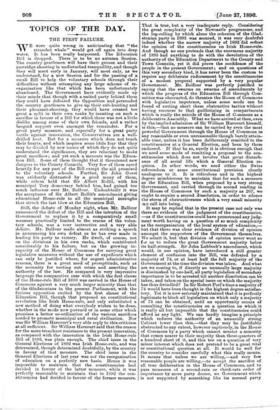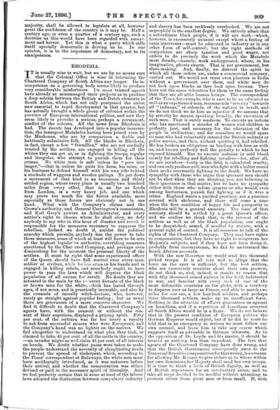TOPICS OF THE DAY.
THE FIRST FAILURE.
WE were quite wrong in anticipating that " the stranded whale" would get off again into deep water. It has been really harpooned. The Education Bill is dropped. There is to be no autumn Session. The country gentlemen will have their grouse and their -partridge shooting in undisturbed tranquillity, and though they will meet early in January, will meet only, as we understand, for a new Session and for the passing of a small Bill to help the voluntary schools through their difficulties without attempting any large scheme of re. organisation like that which has been unfortunately abandoned. The Government have evidently made up their minds that though with a united party behind them they could have defeated the Opposition and persuaded the country gentlemen to give up their cub-hunting and their pheasant-shooting, they would have created too great a split in their own ranks by insisting on such a sacrifice in favour of a Bill for which there was not a little dislike among some of their own friends, and a rather languid support even amongst the remainder. For a great party measure, and especially for a great party battle against innovation, the Conservatives are a well- drilled host. But for a measure which does not touch their hearts, and which inspires some little fear that they may be divided by new issues of which they do not quite understand the significance, they are reluctant to make great sacrifices ; and yet such a measure was the Educa- tion Bill. Some of them thought that it threatened new dangers to the County Councils. Very few of them cared heartily for any part of the Bill except the aid promised to the voluntary schools. Further, Sir John Gorst was evidently distrusted by a good many of them, while others held that Sir Albert Rollit, with his municipal Tory democracy behind him, had gained too much influence over Mr. Balfour. Undoubtedly- it was the acceptance of Sir Albert Rollit's amendment giving educational Home-rule to all the municipal boroughs that struck the last blow at the Education Bill.
Still, the debate of Monday night, when Mr. Balfour announced the defeat of the Bill and the intention of the Government to replace it by a comparatively small measure practically limited to the rescue of the volun- tary schools, was a very instructive and a very able debate. Mr. Balfour made almost as striking a speech in announcing his own defeat as he has ever made in leading his party to victory. He dwelt, of course, not on the divisions in his own ranks, which contributed considerably to his failure, but on the growing in- capacity of the House of Commons for carrying great legislative measures without the use of expedients which can only be justified where, for urgent administrative reasons, there is a great need of promptitude, such as the necessity for rooting out crime and asserting the authority of the law. He compared in very impressive language the comparative ease with which the first clause of the Home-rule Bill of 1893 was carried in the House of Commons against a, very much larger minority than that of the Gladstonians in the present Parliament, with the furious opposition excited by the first clause of the Education Bill, though that proposed no constitutional revolution like Irish Home-rule, and only substituted a new method of doing what everybody wishes to be done, whether in the mode now pursued or in some other which promises a better co-ordination of the various sacrifices needed to promote municipal and rural civilisation. Nor was Sir William Harcourt's very able reply to this criticism at all sufficient. Sir William Harcourt said that the reason for the more trenchant resistance to the present innovation, as compared with the innovation in the Irish Home-rule Bill of 1893, was plain enough. The chief issue in the General Elections of 1892 was Irish Home-rule, and was determined, though determined doubtfully, by the country in favour of that measure. The chief issue in the General Elections of last year was not the reorganisation of education on a perfectly new basis. Hence it was impossible to maintain that the constituencies had decided in favour of the latter measure, while it was perfectly reasonable to maintain that in 1892 the con- stituencies had decided in favour of the former measure. That is true, but a very inadequate reply. Considering• the great complexity of the Newcastle programme, and the log-rolling by which alone the cohesion of the Glad- stonian party in 1893 was secured, it was very doubtful indeed whether the narrow majority of 1892 did reflecct the opinion of the constituencies on Irish Home-rule. And though no one pretends that the enormous majority of 1895 bad anything to do with the devolution of the authority of the Education Department to the County and Town Councils, yet it did prove the confidence of the people in the present Government ; and on questions of this very secondary kind, it has never been the custom to require any deliberate endorsement by the constituencies of a modest proposal supported by a very popular Government. Mr. Balfour was perfectly justified in saying that the swarms on swarms of amendments by which the progress of the Education Bill through Com- mittee was obstructed, do threaten the House of Commons with legislative impotence, unless some mode can be found of cutting short these obstructive tactics without- having recourse to that guillotining in compartments.
which is really the suicide of the House of Commons as a deliberative Assembly. What we have arrived at then, even by the implied admission of Sir William Harcourt himself, is this,—t hat no measure can be carried by even the most powerful Government through the House of Commons is any reasonable or even unreasonable though barely attain- able time, unless it has been deliberately remitted to the constituencies at a General Election, and been by them endorsed. If that be so, surely it is obvious enough that we need some mode of remitting a proposal to the con- stituencies which does not involve that great disturb- ance of all social life which a General Election re- quires. In other words, we need either the Swiss referendum or some constitutional provision closely analogous to it. It is ridiculous and in the highest degree mischievous to maintain that for such a measure as the Education Bill, when proposed by a very strong Government, and carried through its second reading in the House of Commons by such a majority as 267, we ought to require a second dissolution, in order to silence the storm of obstructiveness which a very small minority .:an call into being.
It may be replied that in the present case not only was there no evidence of the judgment of the constituencies, —as if the constituencies could have pronounced any judg- ment worth having on a question of so much complexity as the reorganisation of the local system of education,— bat that there was clear evidence of division of opinion amongst the supporters of the Government themselves. We admit it, but that division of opinion never went so f it as to reduce the great Government majority below its half-strength. Sir John Lubbock's amendment, which would, in our opinion, have introduced a still greater element of confusion into the Bill, was defeated by a majority of 74, or at least half the full majority of the Government at the time the division was taken. And what are we coming to, if directly an unusually large majority is diminished by one-half, all party legislation of secondary importance is to be arrested till another dissolution can be taken, and taken on the special issue on which the majority has thus dwindled? In Sir Robert Peel's time a majority of 74 would have been thought in the highest degree satisfac- tory. Yet it is now seriously maintained that it is perfectly legitimate to block all legislation on which only a majority of 74 can be obtained, until an opportunity occurs of consulting the constituencies on a question on which it is really all but impossible that the constituencies could afford us any light. We can hardly imagine a principle which reduces the authority of an unusually strong Cabinet lower than this,—that they may be justifiably obstructed to any extent, however captiously, iu the House of Commons by a party which cannot muster a minority that comes nearer to their majority than three-quarters of a hundred short of it, and this too on a question of very minor interest which does not pretend to be a great vital or constitutional question at all. It would be well for the country to consider carefully what this really means. It means that unless we are willing,—and very few reasonable people are willing,—to accept the sacrifice of all true deliberation in the House of Commons, and to pass measures of a second-rate or third-rate order of importance by mere party decree, no Government which is not supported by something like its normal party majority, shall be allowed to legislate at all, however great the confidence of the country in it may be. Half a century ago, or even a quarter of a century ago, such a doctrine as this would have been regarded with amaze- ment and horror. Yet this is what a party which calls itself specially democratic is driving us to. In our opinion, it is to the impotence of democracy, not to its omnipotence.

















































 Previous page
Previous page